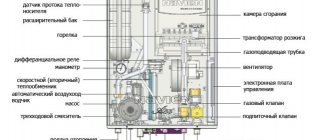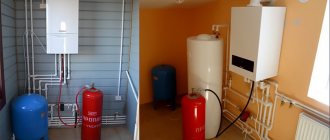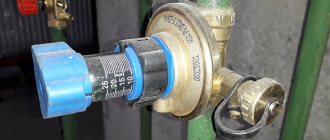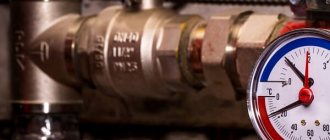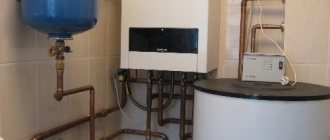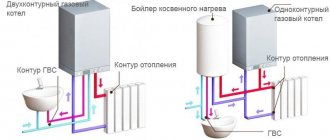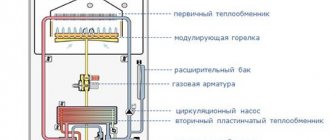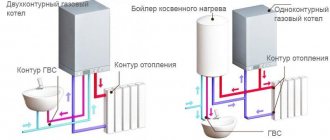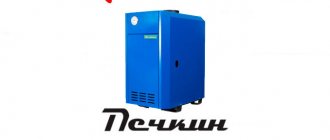Excessively hard water used in the heating system as a coolant contributes to the formation of deposits on the walls of the heat exchanger and lines: salts, scale, small debris. As a result, the cross-section of the lines narrows, the circulation of the coolant becomes more complicated or completely disrupted, gas consumption increases and, in general, the service life of the boiler is reduced.
Even the cleanest water in the domestic water supply is usually hard. Water from deep sources (wells) can also be quite hard. To extend the service life of the gas boiler and the entire heating system, increase the intervals between flushing the heat exchanger and ensure normal operating conditions of the gas boiler, a softening filter is required.
How to understand that the water in the heating system requires softening
Water from surface sources or not the cleanest water supply is guaranteed to be hard and needs to be softened to be used in the heating circuit of a gas boiler. You can verify this using simple examples: scale in a kettle or limescale on a tap.
Heat exchanger of a gas boiler in section. The use of contaminated hard coolant and lack of regular cleaning led to serious consequences: scale and almost complete clogging.
To be sure and test even clean water from a well, you can purchase test strips to determine water hardness. They are sold in stores with coffee machines or branded household appliance stores, pet stores. They are paper strips coated with a reagent, which must be dipped in water, and then their color must be compared with the “result palette”.
According to the current GOST 31865-2012, the unit of measurement for water hardness is °Zh (hardness degree):
- up to 2°F – soft;
- from 2 to 10°F – medium hardness;
- more than 10°F – extremely hard.
In practice, already 4-5°F contributes to the deposition of salts on the walls and the formation of scale. With these and higher results, to ensure normal operating conditions of the gas boiler, you need a water softener, which is one of the filters described below.
The need to use a filter
The principle of operation of the boiler is to heat the coolant, which enters the pipes and already heats the room. The water entering the circuit (regardless of the source) contains small grains of sand, pebbles, a little gravel or earth. All this garbage remains inside, interfering with the correct operation of the equipment.
Even the cleanest water has great hardness, flows through the boiler pipes, and, mixing with debris, settles on the walls in the form of scale. Therefore, it is important to include a water filter in the system. If you do not install it, then:
- the room will not be heated at all or very weakly;
- pipes will begin to leak due to corrosion;
- the heat exchanger will stop working properly;
- the boiler may explode or burn.
Types of filters that soften water in a heating system
Polyphosphate
The simplest and most inexpensive, but effective option. The design of a polyphosphate (salt) filter is simple:
- transparent container/flask;
- plastic cover;
- drain;
- polyphosphate salt crystals.
Water, passing through the crystals of polyphosphate salt, is saturated with sodium polyphosphates, as a result of which a film is formed that envelops hard salts, neutralizing their harm and protecting the system from scale and deposits. After passing through an ion-exchange polyphosphate filter, the water becomes technical and unsuitable for drinking, since polyphosphate is a toxic substance.
The service life of polyphosphate filters, or rather their composition (dissolving crystals of polyphosphate salt), is low. Filler consumption is about 3-5 grams per 1000 liters. It is recommended to completely change the composition of the flask or the assembly if the volume of crystals has decreased by half or more. In practice, this happens on average after 6-8 months. The cost of polyphosphate softening filters is 300-1,200 rubles, and replacement filter crystals are 150-400 rubles.
How to choose a room thermostat and save up to 30% per month on heating
Magnetic
A more expensive and efficient filter with compact dimensions. For gas boilers, it is recommended to use a magnetic water softener. The operating principle is based on magnetic field radiation that transforms the structure of water:
- Flowing through the filter, water changes its physical properties for a short time, as a result of which the crystallization process when heated occurs faster and in the volume of water, and not on the walls of the heating circuit.
- As a result of transformation by a magnetic field, salts that were previously deposited on the walls precipitate - fine-crystalline sludge.
- The sediment passes through the heating or boiling zone without harm to the system. It can also be stopped completely or removed by a coarse filter.
A feature of the magnetic softening method is its short-term effect, so the filter must be installed as close as possible to the boiler heat exchanger (heating zone and active salt deposition). After passing through a magnetic filter-softener, the water does not become technical and does not lose its previous salt composition and taste.
The service life of magnetic softeners is practically unlimited. The average cost of the device is 1,200-3,000 rubles.
Electromagnetic
At high coolant temperatures and high flow rates, conventional magnets are not enough to completely separate salts. To enhance the action of a conventional magnet, electrical voltage is used by placing a special electrical winding on the magnet. However, to soften the water in the heating system of a private home, a conventional magnetic filter is sufficient.
The use of an electromagnetic combination is justified only in industrial systems with high pressure and coolant velocity. Cost: 5-20 thousand rubles.
The best filters for the boiler
Before making a choice, you need to refer to the factory instructions and familiarize yourself with what the manufacturer offers as water treatment for the boiler. Then, in any SES laboratory or even from a water supply company, you need to take complete results of an analysis of the water that will be used to feed the boiler and heating networks. Before you begin selecting possible modifications, choose from a line of boiler or water heater filters.
In addition, when choosing, experts also advise paying attention to the following parameters:
- Productivity - determines the hourly volume of purified water, m3/hour.
- Dimensions and installation area so that the purifier can be integrated into the existing free space in the boiler room.
- Thread diameter - it must correspond to the diameter of the heating systems.
- Brand - it is safer to purchase a filter from a popular manufacturer and in branded stores. Unfortunately, there are many counterfeits in the retail chain, and in addition, in branded stores you can issue a reliable guarantee and consult on the procedure for using the filter.
Magnetic filter Aquamax XCAL MEGAMAX
Aquamax XCAL MEGAMAX 1/2″ is an Italian highly efficient magnetic anti-scale filter for boilers and boilers. It cleans the heating surfaces of boilers from limestone formations. Designed for heat supply systems with high circulation rates.
The MEGAMAX magnetic softener is made of first-class non-corrosive steel and is considered not dangerous to people. The device does not require changing filter materials. Suitable for boilers with 1/2" piping and can purify water 0.8 m3/hour. Price: 1860 rub.
Phosphate filter Ecosoft SCALEX 200
The filter for the heating boiler Ecosoft SCALEX 200 prevents the formation of scale in heating systems and contains an ecological filter media that does not have polyphosphate, which allows its use not only in heating boilers, but also in hot water supply systems.
The SCALEX 200 filter has the function of chemical water purification and performs mechanical purification of suspended solids and rust products up to 100 microns in size.
Ecosoft SCALEX 200 does not remove hardness salts from make-up water, but has a comprehensive effect on them thanks to the simultaneous use of 3 protection mechanisms:
- Stopping the growth of hardness salt crystals.
- Destruction of the beginnings of foci of scale crystallization.
- Prevents the connection of scale-forming crystals with each other.
The filter can operate without replacing the filter material for 6 months. Cost 1260 rub.
Anion filter SVOD-AS sbb10
A powerful softener can be used not only in domestic heat and power engineering, but also in industrial boiler houses. The device purifies water from hardness salts, heavy metals and any suspended pollutants and impurities.
Water is processed in a special anion exchange cartridge, the reagent of which is processed using a special technology with chemically active components. As a result, Ca and Mg ions in the water are replaced by Na ions, thereby creating easily soluble sodium salts that do not deposit on hot boiler surfaces.
The filter housing is made of plastic that can withstand medium pressure up to 6 atm. One cartridge can process 262 m3 of water and has a shelf life of three years. Price 6700 rub.
Magnetic filter Caleffi XS
The Italian filter is designed for boiler water treatment and combines two types of cleaning: mechanical and magnetic, using a neodymium magnet and a transparent sludge collection chamber to visually control the process. The device can operate in an environment at a pressure of 3 atm. and hot water temperature 90 C. Hourly productivity for make-up water is 3.5 m3/hour. Warranty - three years. Price: 5600 rub.
What else to look for when choosing
All softening filters for water of a certain type have the same principle of operation and differ only in the quality of work, less often - in practically insignificant design features. Therefore, there are no specific selection criteria. However, we recommend paying attention to:
- productivity - also throughput, measured in m3/hour or l/hour;
- size - magnetic softeners are slightly larger than the diameter of the pipe, while polyphosphate filters require a lot of space around the pipe;
- thread diameter - must match the diameter of the pipes used in the planned installation location;
- manufacturer - it is better to choose a filter from a well-known manufacturer, preferably in specialized retail outlets that can provide repairs or replacements during the warranty period.
How to clean a gas filter
To do this, you need to perform the following sequence of actions:
- Remove the lid.
- Remove the flange plug.
- Take out the cassette and shake out all the dirt that has accumulated.
- Wash the cassette in a solvent such as benzene.
gas delivery in Moscow . You just need to go to the appropriate page of our website. There you will also find out how much it costs to refill a gas tank with liquefied gas. If you have any questions, we will be sure to answer them when you contact us. Let's do this as quickly as possible. We are always ready to meet halfway when such a step meets mutual interests.
Connection to the heating system
Simplified connection diagram for a softening filter.
You can install the softening filter yourself; household models have a threaded connection with a diameter of 1/2″, less often – 3/4″. A filter is installed at the inlet of the gas boiler, i.e. on the return line, as close to it as possible and in no case further than 2 meters. Before connecting, the polyphosphate filter must be washed in order to wash out possible small fractions of the filler. The installation process itself is simple:
- A sealant is wound onto the prepared return threaded connection. This can be a sealing thread or fum tape.
- All that remains is to screw the filter nuts onto the threads and tighten them well with a wrench.
Before fully starting the heating system, we recommend checking the tightness of the connection. It is recommended to install shut-off valves on both sides of the filter.
Choice
Choosing a filter for a gas boiler is a responsible task, since your decision determines how reliable and safe your gas supply system will be. Today, the market for heating equipment and components offers a wide variety of filter units, which can be classified according to a number of characteristics. In particular, there are direct-flow and rotary filters, which differ from each other in the direction of gas movement. Depending on the design features, angular and linear devices are distinguished. They are made mainly from steel or aluminum. Moreover, these can be either welded structures or components produced by casting.
If you decide to purchase a filter for a gas boiler, start by assessing the filter material. There are two main types of material – mesh and hair.
In the first case, a special metal woven mesh is used as a filter element, which effectively traps small dust particles. The hair filter is a cassette with pressed horsehair or nylon thread impregnated with viscine oil.
Let's look at popular products that are in demand in Russia to learn more about what a gas filter is.
Alternative Mitigation Methods
In most individual heating systems of a private home, water is not drained for many years. Therefore, instead of constantly softening the water, it is reasonable, although not always cheaper, to immediately fill:
- distilled water (see manufacturer's recommendations in the instruction manual);
- already purified, soft and desalted water;
- boiled water.
Under no circumstances should you add acetic or other acids, cleaning or anti-scaling concentrates to the coolant. Such products are used for flushing and cleaning the boiler heat exchanger and heating system, but not for continuous use.
Prices for water softeners for a gas boiler
| Manufacturer and model | Type of softener | Cost, rub. |
| Aquaphor Styron | polyphosphate | 290 |
| Unicorn FMP 2P2V 5″ | polyphosphate | 580 |
| New Water B120 | polyphosphate | 1 200 |
| MWS MVS Dy 10 (1/2) | magnetic | 1 490 |
| New Water A032 | magnetic | 1 900 |
| FIBOS mini | magnetic | 4 900 |
Gas boilersInstructionsBoilersEquipment for boiler rooms

